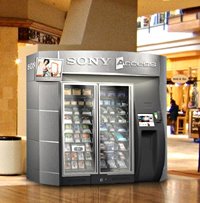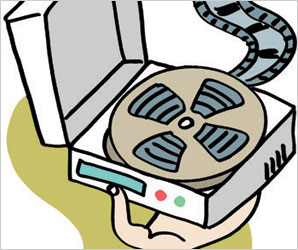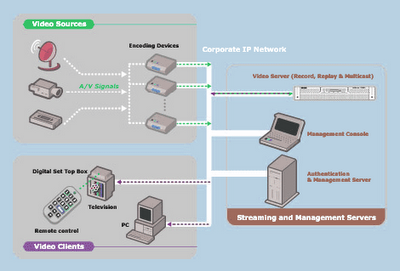Hmmm..... Snickers or a digital camera....
 Well, try as I do to keep up, I am still surprised by developments in new media like this one. I've studied the diffusion of new media innovations for 25+ years and worked one holiday season in a large, national electronics retail store in the home video department (participant observer). I live near Atlanta and, while visiting the Sharper Image store at the Mall of Georgia last night (some say the mall is second in size only to the Mall of America; I don't know if that is true, but it's certainly big), I learned that Sony had put up a vending machine (kiosk, if you prefer) that includes a wide variety of Sony products from extremely expensive to fairly expensive. It looks like a large, double glass door refrigerator and this one is located next to the movie ticket sales area. I go there to see movies with my daughter fairly often, so this was put in some time after the film "Barnyard" came out.
Well, try as I do to keep up, I am still surprised by developments in new media like this one. I've studied the diffusion of new media innovations for 25+ years and worked one holiday season in a large, national electronics retail store in the home video department (participant observer). I live near Atlanta and, while visiting the Sharper Image store at the Mall of Georgia last night (some say the mall is second in size only to the Mall of America; I don't know if that is true, but it's certainly big), I learned that Sony had put up a vending machine (kiosk, if you prefer) that includes a wide variety of Sony products from extremely expensive to fairly expensive. It looks like a large, double glass door refrigerator and this one is located next to the movie ticket sales area. I go there to see movies with my daughter fairly often, so this was put in some time after the film "Barnyard" came out.
I believe this practice has been in use in Japan for some time, but it's jolting to see something like this in the mall that's northeast of Atlanta where I live. I wondered what the retail shops in the mall thought of this competition only to discover that a Sam Goody's record store had closed as had a video store, two places that might have sold the same products. So I'm not sure this kiosk competes with any stores at the mall (there are free standing stores like Circuit City, hhGregg, and Best Buy adjacent to the mall).
 But it didn't stop there! I learned that I could go to an area of the mall where, quite franky, there is not a lot of traffic and purchase an iPod from another vending machine (or kiosk). This dispenser is operated by middleman Zoom Systems. Sadly for good guy academics like me who just want to understand human behavior, I doubt there is much if any public data on how well this form of selling works.
But it didn't stop there! I learned that I could go to an area of the mall where, quite franky, there is not a lot of traffic and purchase an iPod from another vending machine (or kiosk). This dispenser is operated by middleman Zoom Systems. Sadly for good guy academics like me who just want to understand human behavior, I doubt there is much if any public data on how well this form of selling works.
When shopping on the web began, you could buy anything from CDs to vegetables. I told my students at the time that any product that won't vary depending on where you purchase it will have a better chance being sold on the web that those that did depend on the seller. Obviously, selling fresh produce on the web proved to be a challenge while books and CDs were easily sold online (and led to the success of amazon.com and cdnow.com). But who will buy an iPod from a vending machine. It seems to me that this makes sense for someone who's already made the puchasing decision and, perhaps, the kiosk's convenience outweighs any fears of bum products being dispensed. Perhaps it simply serves as a "window shopping" experience.
What I would like to know is will Zoom Systems (and their competitors if this form of selling works in the U.S.) in any way serve as a means to accelerate the diffusion of established innovations like the iPod or not. I ask my silent majority of readers to post a comment with your ideas or even point us to articles about how well selling by kiosk works. I just might have to try a quick search and see what I find. Remember, folks, I am provincial. I believe the U.S. market is complicated enough and admit that I focus my energies here.
You may use this content (better still, argue with me!), but please cite my ideas as © 2006, Dr. Bruce Klopfenstein. Find any typos! Don't smite me, let me know!
 Thanks blogger community for solving my mysterious error. I'll hang on to
Thanks blogger community for solving my mysterious error. I'll hang on to 
 Image courtesy of XSERVE India Pvt. Ltd. and may not be reproduced.
Image courtesy of XSERVE India Pvt. Ltd. and may not be reproduced.


